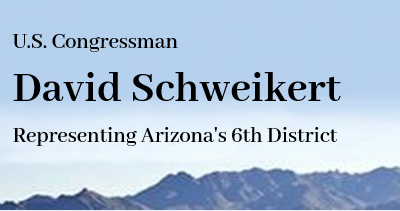WASHINGTON, DC – Today, Congressman David Schweikert (AZ-06) released the following statement applauding key House and Senate Committees recently introduced legislation to protect patients from surprise billing and provide transparency for medical payment disputes.
“I am very pleased to see us come together to end surprise billing and provide patients with the transparency they deserve when receiving care. This legislation is far overdue, and will put patients first. Americans can now be taken out of the negotiation process, and start a visit with an understanding of the services they are being provided. I look forward to continuing to work with my colleagues to provide accessible, convenient, and affordable care.”
Background:
The bipartisan, bicameral agreement protects patients and establishes a fair payment dispute process including:
- Holds patients harmless from surprise medical bills, including from air ambulance providers, by ensuring they are only responsible for their in-network cost-sharing amounts, including deductibles, in both emergency situations and certain non-emergency situations where patients do not have the ability to choose an in-network provider.
- Prohibits certain out-of-network providers from balance billing patients unless the provider gives the patient notice of their network status and an estimate of charges 72 hours prior to receiving out-of-network services and the patient provides consent to receive out-of-network care.
- Creates a framework that takes patients out of the middle, and allows health care providers and insurers to resolve payment disputes without involving the patient.
- Under the agreement, insurers will make a payment to the provider that is determined either through negotiation between the parties or an independent dispute resolution (IDR) process. There is no minimum payment threshold to enter IDR, and claims may be batched together to ease administrative burdens.
- If the parties choose to utilize the IDR process, both parties would each submit an offer to the independent arbiter. When choosing between the two offers the arbiter is required to consider the median in-network rate, information related to the training and experience of the provider, the market share of the parties, previous contracting history between the parties, complexity of the services provided, and any other information submitted by the parties.
- Following an IDR process, the party that initiated the dispute may not take the same party to arbitration for the same item or service for 90-days following a determination by the arbitrator. However, all claims that occur during the 90-day period are eligible for IDR after the 90-days.
- Provides additional consumer protections when insurance companies change networks, including a transition of care for people with complex care needs and appeal rights for consumers.
- Empowers consumers by providing a true and honest cost estimate that describes which providers will deliver their treatment, the cost of services, and provider network status.
- As part of the legislative agreement, the package includes a long-term extension of expiring public health programs, including: Community Health Centers, National Health Service Corps, Teaching Health Centers, and Special Diabetes Programs.
Legislative text is available HERE.
Section-by-section is available HERE.
###
Back to News

